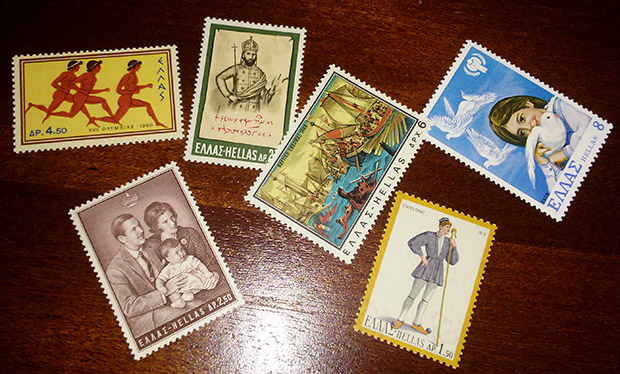Stamps of My History

Alexander Billinis
Moving is never easy. It is a loss of nerves, and in my case, pounds from work and stress, and it always costs more than you anticipate. Things get lost, and broken. Sometimes, however, things do get found. During the moving chaos, items lost or forgotten (particularly when, as in our family, we have moved about ten times in fourteen years of marriage) suddenly (re)-emerge.
As I returned from our new South Carolinian home to finish off the move from our former Chicago home, I wearily opened yet another box, one long sealed, likely from before our eight years in Europe. This one was full of good things.
In the chaotic aftermath of my father’s death from Alzheimer’s, many family heirlooms were lost to my eldest sister and me. Among the items my father intended for me included several folders and binders of stamps, collected both as a side hobby and from an extensive correspondence in Greece and Cyprus. Opening the box, several booklets and packages of painstakingly compiled Greek stamps from four decades fell into my lap.

I turned the pages reverently, as beautiful, brightly colored images of Greece’s four millennia of history, national costumes, (ex) Kings and Queens, and Junta Phoenixes shone behind protective covers, compiled by a man who loved Greece with such visceral intensity. Whether from the exhaustion of too much cardboard and carrying, or the memory of his gentle heart, I cried.
As moving—and valuable—as this compilation was, together with a beautifully bound edition of the 1980 Moscow Olympics, with stamps from a country that no longer exists; it was, rather, a haphazard manila envelope that touched me the most. Stuffed with well over one hundred envelopes from Greece and Cyprus, most of them emptied of their letters, but the return addresses, dates, and once again, the stamps, carried stories personal and national. I found it possible, using the date, the sender, and the stamp’s era and subject to surmise something of the context and contents.
In particular, there were two sets of letters that recalled personal and difficult national histories. For as long as I can remember, my father had a subscription at Eleutheroudakis Book Store, a virtual shrine to us every time we were in Greece (a chain now sadly defunct, but it was there when I lived there, a source of solace from the “Greek Reality”). Over the course of ten years, from mid 1970s to mid-1980s, a dozen tome edition, Istoria tou Ellinikou Ethnous (History of the Greek Nation), arrived at our Salt Lake City home, the arrival of each book being an occasion for schoolboy delight on my father’s part. I read the typed invoices, and the correspondence back and forth, usually my father complaining about the delay in a long-awaited tome or the arbitrary change of price in dollars. This series, now in a place of honor in our home library in Serbia, was the foundation both of my Greek and my knowledge of Greek history. The correspondence and the books they paid for have played a singular role in my life and identity.

Other letters had beautiful stamps, often enough depicting nature and (until 1974) neutral, non-nationalistic themes. The stamps were in Greek, but also in Turkish and English. The dates, all from the mid to late 1970s, from the immediate aftermath of the Turks’ vivisection of this leaf shaped island, are likely from Cypriot friends and organizations thanking my father for his efforts on their behalf. Thumbing through the stamped, franked envelopes made me proud of my father’s past efforts, and reminded me that the old would inflicted in 1974 has yet to be healed. More than any viral meme on Facebook, these silent envelopes are a call to action.
My initial review of the stamps, in haste during the move, turned into a longer one, as I showed my family our history in stamps, and then I put these words to paper. These stamps serve as elegant markers of a slower, more deliberate time, and their correspondence and contents stamped their identity on me. This legacy, retrieved from cardboard and dust, now returns to a place of honor in our new home.
The original version of this article appeared in Weekly Hubris (www.weeklyhubris.com)











0 comments